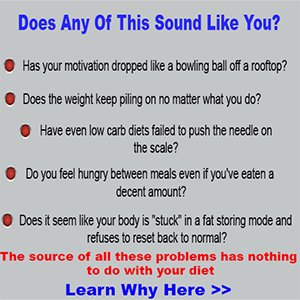Do You Feel Guilty When Dieting?
Are you a person who’s looking to lose weight, bust fat, and look good in the jeans you wore in high school?
Do you often shop around on the internet, the diet book section, or your kindle for the BEST diet – one that shreds the fat and makes you look SKINNY again?
And are you the same person that has CUT their calories – sometimes to dangerously low levels – just to look good in a bikini, tank top, or even naked?
If you fall in ANY of these categories, you may find it welcoming to know there are hundreds – if not thousands – of people just like you.
In fact, each day there may be thousands of people beginning, in the middle, or finishing a diet or weight loss program.
And of those people, very few may actually find overall success with their diet program.
Now, today, we are not going to talk about “diet” per se, but what we are going to talk about is the effects that restricting calories may have on your body – or more importantly – your sense of guilt.
Calorie Restriction and Mood
Although cutting calories may be the preferred method to weight loss, many people really don’t truly understand the concept.
For example, if you are eating fewer than say 1200 calories, than you may be putting yourself – and your health - at increased risk for complications.
Cutting calories through diet alone may lead to slower metabolism, increased risk for relapse, and starvation.
And all of those situations may lead to preservation of your fat stores and loss of your metabolism-boosting lean muscle mass.
Besides the physical complications that may arise from cutting to dangerously low calories, it seems to also have an impact on your brain – especially as it related to feelings of guilt.
And there’s proof!
A new study may show a link between cutting calories (but not food intake) and changes in your mood and other aspects of mood.
Here’s what the researchers found…
First, the authors found that restraint was NOT associated with food intake – at all!
However, what they DID find was that restraint eating WAS associated with increased levels of guilt – which was almost always related to food intake.
Simply put: the participants did NOT eat less, but ended up feeling guilty.
They concluded:
“The results of these studies suggest that restraint is not an indicator of actual restricted food intake, but rather a reflection concerns about food and eating manifested in eating-related guilt.”
Dieting and Guilty Feelings
Dieting, cutting calories, or restricting your food intake may all be ways people try to lose weight and keep it off.
However, if you cut calories long enough – without restricting your food intake – you may find yourself feeling very guilty.
And this could lead to negative feelings towards food, dieting, and even your trainer or dietitian!
But if you’re serious about losing weight, then you really should read the follow:
Don’t Take Another Weight Loss Supplement Without Reading This First >>
References:
de Witt Huberts JC. Evers D, de Ridder DTD. Double Trouble: restrained eaters do not eat less and feel worse. Psychology& Health. 2012. Doi: 10.1080/08870446.2012.751106.
About Jayson Hunter & Jaylab Pro

Jaylab Pro was founded by Registered Dietitian Jayson Hunter. Jayson has been recognized as one of America's foremost weight loss experts by America's Premier Experts™. He has also been featured in USA Today for this accomplishment. Jayson is also a best-selling author having co-authored multiple books in health & fitness and business growth. Jayson and the Jaylab Pro team are proud to create content that helps improve the lives of millions of people around the world. We hope you enjoy it just as much as others have.
 If you order a JayLabPro SmartShip product or any Combo Package, we will automatically ship you a new supply of the product or products you have ordered every month, starting 30 days after your initial order is shipped, and continuing until you cancel. The credit card you are using today will be billed the lowest available price for those product or products when your order is shipped, but shipping will be FREE. You may log into your customer account or call our customer service department toll-free at 1-888-9GETPRO (1-888-943-8776) between the hours of 8am – 9pm EST Mon-Fri to cancel future shipments, customize the timing of your shipments, or change the credit card used for billing.
If you order a JayLabPro SmartShip product or any Combo Package, we will automatically ship you a new supply of the product or products you have ordered every month, starting 30 days after your initial order is shipped, and continuing until you cancel. The credit card you are using today will be billed the lowest available price for those product or products when your order is shipped, but shipping will be FREE. You may log into your customer account or call our customer service department toll-free at 1-888-9GETPRO (1-888-943-8776) between the hours of 8am – 9pm EST Mon-Fri to cancel future shipments, customize the timing of your shipments, or change the credit card used for billing.










